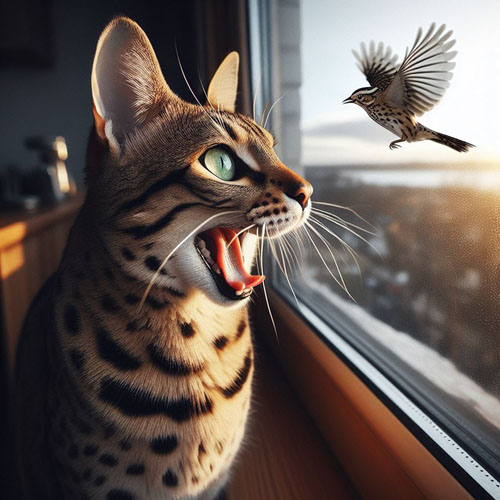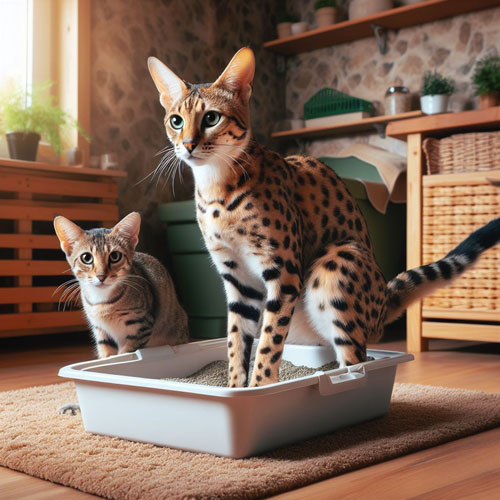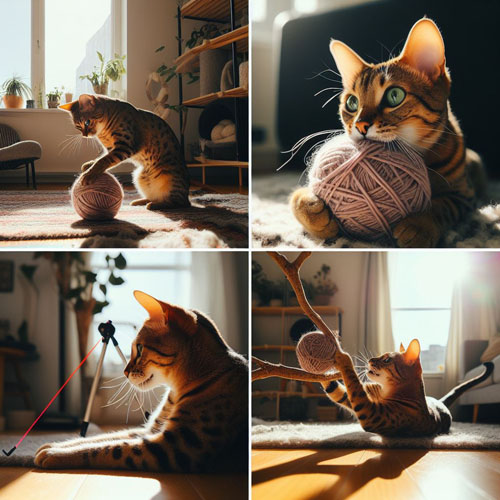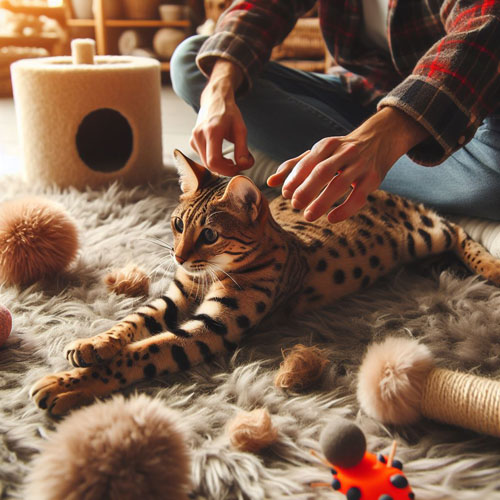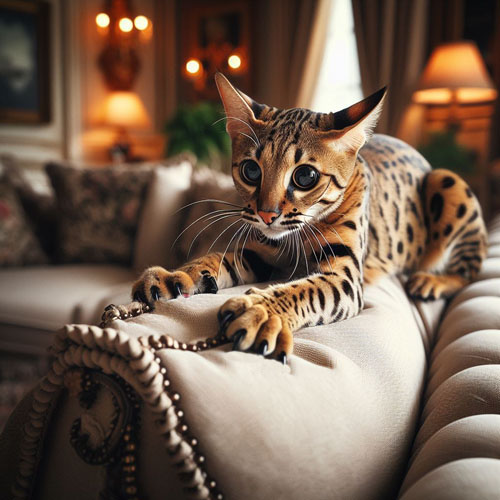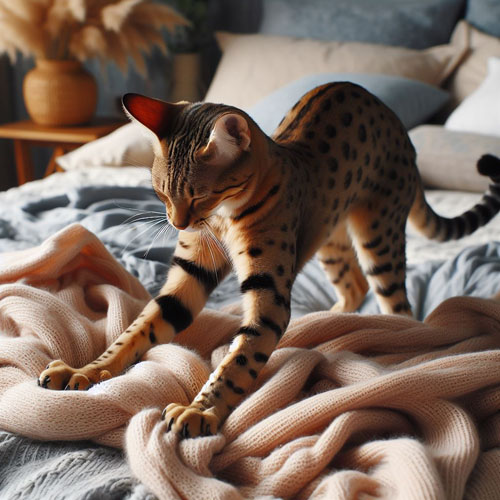FELINE BEHAVIORS: Why Does My Savannah Cat Cat Do This?
The fascinating Savannah Cat
- The Savannah cat is a fascinating hybrid breed that is a cross between a domestic cat and a serval, a wild African cat. They are known for their striking appearance, with long legs, large ears, and a spotted coat. Savannah cats are highly intelligent and active, and they require a lot of mental and physical stimulation. They have a unique personality and can form strong bonds with their owners. However, they are not suitable for everyone as they can be challenging to care for due to their high energy levels and need for space to roam. It is important to do thorough research and consider the responsibilities before deciding to bring a Savannah cat into your home.
Why they drop favorite toys in the water and food bowls
- Savannah cats exhibit their natural hunting instincts and affinity for water by submerging their toys in the water bowl. This behavior stems from their hybrid lineage, which combines a domestic cat with a wild African cat called a serval. These captivating felines possess remarkable physical features, including lengthy legs, prominent ears, and a coat adorned with spots. Renowned for their intelligence and active nature, Savannah cats necessitate ample mental and physical stimulation. They possess a distinct personality and can develop strong bonds with their owners. Nevertheless, their high energy levels and requirement for ample space to explore make them a challenging pet for some individuals. Prior to welcoming a Savannah cat into your household, it is crucial to conduct thorough research and carefully consider the responsibilities involved.
Who Do cats knead with their paws?
- It is commonly understood that when a cat kneads your stomach with its paws, it is a display of affection towards you. Typically, the cat will exhibit a distinct expression of love on its face, accompanied by purring and possibly even slight drooling.Cats knead with their paws as a natural behavior. It is believed to be a leftover instinct from when they were kittens and would knead their mother’s belly to stimulate milk production. Cats also knead as a way to mark their territory and show affection.
My cat started hissing all of a sudden while being petted
- Your feline companion may occasionally hiss at you or attempt to scratch or bite you seemingly out of nowhere, even during a seemingly pleasant moment of petting or stroking. However, this does not indicate that your cat no longer likes you. More likely, it is simply their way of signaling that they have had enough of the petting and stroking, especially if it has gone on for longer than they prefer. Upon reflection, you may realize that you had unintentionally prolonged the session or became distracted while petting, unaware that your cat was becoming uncomfortable and that a significant amount of time had elapsed.
Licking or chewing plastic bags
- Explaining this behavior can be quite challenging, as certain cats are more inclined towards it compared to others. Many experts in feline behavior have reached the consensus that some cats are irresistibly drawn to the faint scent of plastic and/or film surfaces. Additionally, they believe that the coolness and texture of these materials provide a pleasant sensation on the cat’s tongue. There could be several reasons for this behavior, including boredom, stress, or seeking attention. It is important to redirect the cat’s behavior and provide alternative forms of stimulation to prevent them from ingesting harmful substances or choking on plastic.
Why does my cat play in the middle of the night
- Savannah cats are known for their playful and active nature, and it is not uncommon for them to exhibit more activity during the nighttime hours. This behavior can be attributed to their wild instincts, as they are descendants of African serval cats, which are nocturnal hunters. Additionally, Savannah cats have a lot of energy and need regular exercise and stimulation to keep them entertained. Playing in the middle of the night may be their way of burning off excess energy and engaging in natural hunting behaviors. It is important for owners to provide adequate playtime and enrichment during the day to help reduce nighttime activity.
Chattering at birds with their teeth
- Savannah cats are known to exhibit a behavior called “chattering” when they see birds. This behavior is thought to be an instinctual response to prey and a way for the cat to express excitement or frustration. It is believed that the chattering is a form of communication between the cat and the bird, mimicking the sound of the prey’s movement. The exact reason for this behavior is not fully understood, but it is believed to be a combination of natural hunting instincts and frustration at not being able to catch the bird.
Burying the food bowl
- On occasion, following a meal or when you place a dish of moist food in front of your cat, they may attempt to communicate their dissatisfaction by attempting to “bury” the entire bowl! This behavior can also manifest when the cat is unhappy with the placement of their food bowl, the food itself, or perhaps when they are not particularly hungry. In such instances, the cat may be trying to “bury” their food (which they perceive as “prey”) for later consumption, when they feel more inclined to eat.
Wanting to drink form the faucet
- Cats naturally have a preference for fresh water. The sound and sight of water flowing from a faucet are particularly enticing to their senses, and they may even rely on their sense of smell to determine the freshness of water. Despite the appearance of cleanliness, bacteria can accumulate rapidly in ceramic and plastic bowls. To ensure your cat’s well-being, it is advisable to use stainless steel bowls for both food and water. Additionally, it is recommended to change your cat’s water daily, thoroughly rinsing or washing the water bowl beforehand. Even after just a few hours, standing water loses its oxygen content, and cats are intelligent enough to recognize that the freshest water contains ample oxygen, which is abundantly present in running tap water.
Attacking my ankles when walking by
- Cats may attack ankles when walking by for a number of reasons. It could be a form of play behavior, as cats are natural hunters and ankles resemble small prey animals. It could also be a way for cats to gain attention or seek interaction with their owners. Additionally, cats may exhibit this behavior if they are feeling stressed or anxious. Providing appropriate outlets for play and mental stimulation, as well as addressing any underlying stressors, can help reduce ankle attacks from cats.
Burying outside the litter box
- Cat owners may wonder why their feline friend is burying their waste outside of the litter box. There are several possible reasons for this behavior, including medical issues, stress or anxiety, territorial marking, or dissatisfaction with the cleanliness of the litter box. It is important for cat owners to monitor their cat’s behavior and consult with a veterinarian if necessary to address any underlying issues and ensure proper litter box training.
Nursing on blankets
- Cats may nurse on blankets or other objects due to various reasons. It could be a natural instinct from their kitten-hood when they nursed from their mother. It can also be a sign of comfort or security, as the behavior mimics the feeling of being with their mother. In some cases, it could be a compulsive behavior caused by stress or anxiety. Providing appropriate outlets for their need to nurse, such as plush toys or soft blankets, can help redirect the behavior and provide comfort for the cat.
Trying to bolt out the door when I open it
- Cats often try to bolt outside when the door is opened due to their natural curiosity and desire for exploration. They may be attracted to the sights, smells, and sounds outside and want to investigate. When the door is opened, a Savannah Cat sees it as an opportunity to explore the outside world. It is important for owners of savannah cats to be cautious when opening doors, as these cats are known for their curiosity and desire to escape.
- Additionally, if a cat is not receiving enough mental or physical stimulation indoors, they may be more likely to try and escape. Understanding these instincts and providing appropriate enrichment and stimulation can help prevent cats from attempting to bolt outside when doors are opened.
